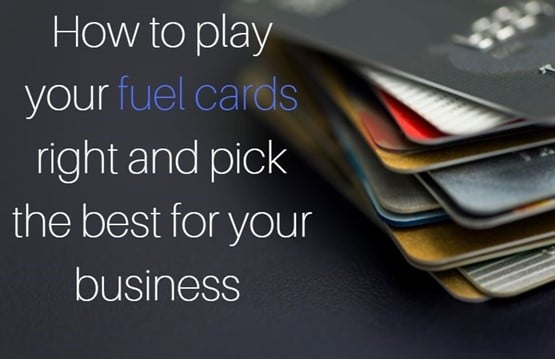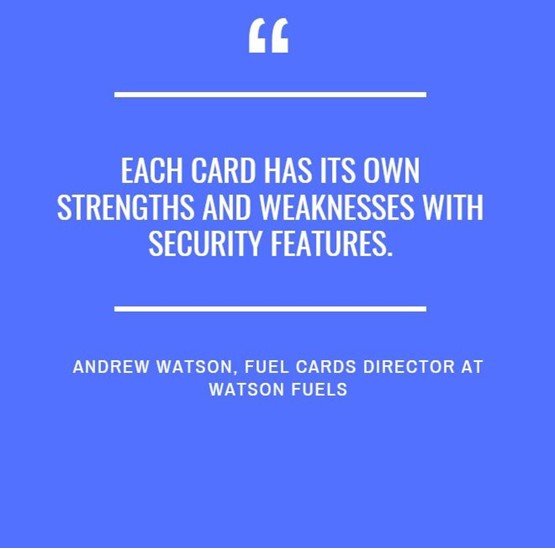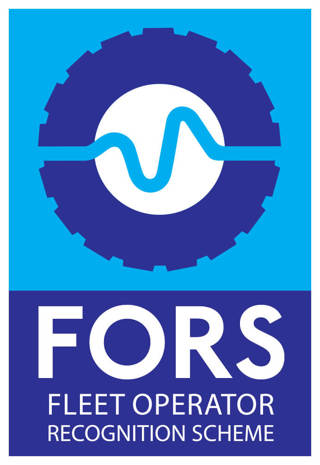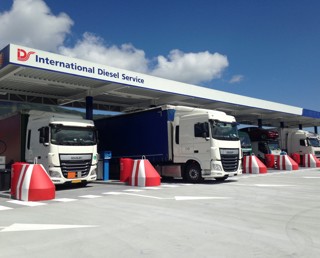Consider the four Cs – control, convenience, cost and credit – when weighing up which fuel card best marries up with the requirements of your business. By Matt de Prez
Fuel is a major and unavoidable cost for any business operating a fleet of vehicles and fuel cards offer the simplest and most cost-effective way of buying it.
Choosing a fuel card isn’t without its challenges, though, as there are many providers, different types of card and a wide array of offers.

Fleet operators turn to fuel cards to save them time and money, whether that’s from competitive pricing, fewer dead miles, fraud prevention or tools and services to reduce the amount of time they spend on admin.
Fuel makes up a large percentage of many companies’ costs so having something straightforward to use that helps manage that cost is a huge benefit to businesses. This is particularly true at the moment when fuel prices are so volatile.
Minimising this volatility allows businesses to plan ahead and manage their cashflow effectively.
The main players in the fuel card market include the big oil companies BP, Esso and Shell plus Keyfuels and Allstar, part of the Fleetcor Group.
Smaller firms also offer fuel cards and a number of organisations, including leasing companies have rebranded cards as part of their package.
Before choosing a fuel card, it’s important to work out what you want from it.
Fuel cards can simply be debit cards, allowing drivers to pay for fuel anywhere in the country.
They can also be sophisticated tools that provide valuable fleet data and offer discounted prices.

Paul Holland (above), chief operating officer at Fleetcor, says there are four key attributes – the four Cs – that fleet managers want from a fuel card: control, convenience, cost and credit.
“If you’re employing drivers and they are out on the road they need the ability to refuel their vehicle. You need to give them some controllable means to be able to do that,” he says.
“Obviously, the more control and accountability you have, the more secure your business will be. We all have to manage our risks accordingly.”
By definition, a fuel card can only acquire fuel. In some cases it is possible to specify that the card can only draw the type of fuel that you want it to. For example, if you operate a diesel-only fleet then there is no need to have an open fuel card.
A number of cards allow fleet operators to put added value products on there as well – such as AdBlue, car wash tokens and oil.
Holland says: “One of the critical things we’ve done is to develop Control Max. As well as just being able to limit drivers to being able to buy fuel, you can have much more control over the activity of purchasing on that card.
“You can control how much that card is used in a day, the number of transactions allowed per day, the volume of fuel bought and even the days and hours of the week it is used.
“Our customers can build the fuel card capabilities, very specific to their fleet profile. This is something that has evolved significantly over the past couple of years.”
A key element of any fuel card is that the driver is able to use the card wherever they need to.
Fuel cards can be linked to a specific brand of fuel station – often accompanied by a discount.
But, if your vehicles operate in areas where that particular supplier has poor coverage, they may be unable to refuel using their card, costing the business more money.
A number of providers will allow third party site access, but often the fleet will pay pump prices if they have not negotiated a discount with the fuel card provider.
Andrew Watson, fuel cards director at Watson Fuels, says: “Any customer concerned about coverage is probably on the wrong product for their needs; our ability to be impartial means we tailor the card to the customer.
“From experience, the majority of drivers have set routes so, once our team has established the driver’s individual needs, we’ll then determine the most suitable card for them.
"We have access to 6,267 forecourts so encourage our customers to use the site locator tools we offer and relevant network smartphone applications to ensure coverage is never an issue.
“As providers, the onus is on us to create that simplified, seamless user experience the customer expects.”

Anglian Water offers drivers a choice of three fuel cards.
Stewart Lightbody (above), head of fleet, says: “We used to be solely with Shell, but we had geographic issues so we added BP. Last year, our procurement team decided to add a third, so we now have Allstar as a contingency.
“The reality of that is I’ve now got three relationships, three invoices and three sets of data, all in different formats.”
In addition to convenience, fuel cards can result in cheaper costs by negotiating discounts on pump prices.
Discounts can be done in a variety of ways, but are likely to factor in fuel type, fuel volume and fleet size.
Whether you can commit to using one brand of fuel station will also have a bearing on how much can be saved.
“BP fuel cards have developed fixed and capped price offers whereby customers can fix or cap a percentage of their fuel for up to 12 months at a time, providing stability in an ever-changing world,” explains Andy Allen, UK fuel cards manager at BP Fuel Cards.
Stuart Wiseman, group fleet manager at Nationwide Window Cleaning, said: “We get a weekly price, every Friday, and I keep a record of how fuel prices are going and I can forecast. When it went up 1.6p per litre I was able to forecast the impact of that on our budgets.
Watson fuels has seen an increase in the number of customers fixing their diesel price on fuel cards for between six and 24 months to manage risk and control budgets.
“Cost is everything in the commercial fleet sector,” says Holland. “Nobody buys fuel from a particular supplier for any reason other than cost.
“The Keyfuels network gives the balance between universal acceptance and discount. We’ve balanced up where you can get good commercial pricing within the biggest network that you can, with access to more than 2,750 sites.
“That means, effectively, you have as a good a convenience as you can have within the price that typically a commercial operator would be prepared to pay.”
David Fisher, fleet manager at Rexel, uses a Shell fuel card. He says: “Start off by having a look at what is available. Include all the big players.
“I found very quickly the smaller businesses offer a slightly worse deal than all the bigger businesses cards, and with a monthly card fee.
“We stuck to the big four and went to tender with those guys, looking at a Platts price offering on diesel, trying to introduce a discount on unleaded for hybrids and ensuring that the business we were going to partner with had the ability to be used at third party sites as necessary.
“Not everybody has the best coverage. For the majority of them, Scotland and Ireland are big issues.

Rexel’s 530 commercial vehicles operate from site, so Fisher has locked them down to Shell only. They (Shell) did mapping to check all our sites are within two miles of a Shell site.
“We locked a fixed rate for 12 months on some of our vehicles. With the massive fuel hike that has just come into play, that has been very worthwhile. All of our HGV fleet and 60% of our LCV fleet have the fixed rate. It covers the majority of vehicles at our main hubs.”
Wiseman opted for Keyfuels. “They’ve got a nice mix of garages to use, it’s a simple app on my phone, I can find one wherever I am and I can plan a route with it. But it’s also the reports coming back in I value,” he says.
“I can see what every vehicle has drawn, where it’s been drawn, how often so you can pick up anomalies – that vehicle has had two drawings in a week and has only done so many miles. It gives us a bit more control of the fleet usage.
“We used to have a fuel card that was for supermarkets (paying pump price) but there was no saving. At least with this, we’ve got a saving.”
Lightbody points out that discounts can vary dependent on where the vehicle is filled up. “With Allstar, to get the best deal, you have to concentrate your spend through a particular vendor. We need the data that says here are all your missed opportunities.
“We need that information to talk to the driver and help them understand that, while it might be easier for them to fill up in one place, it might not be best for the business.
“There is a lot that can be done, but it doesn’t feel very easy. You have to micro manage it to get those savings.”
Risk of fraud
Entrusting drivers with the ability to pay for fuel with a company fuel card leaves a business open to the risk of fraud.
The main issues to overcome often relate to fraudulent business mileage claims or filling up other vehicles with the fuel card.
Watson says: “Fraud and security is a topic we come across, especially for customers who have been burnt before.
"Each card has its own strengths and weaknesses with security features, so once we’ve identified their concerns, we set up bespoke controls and alerts, along with our Fuelcard Reporting Analyst and frequent transactional data reports.”
Lightbody believes fraud will always be an issue.
“We use chip and pin, but is the vehicle on the forecourt the one on the card?
“It’s only by spending the time to go over the reports that you pick out the things the supplier should be able to notice.
“Everyone is busy. It would be really nice if someone came to me and said ‘we’ve reviewed your fuel spend and this particular vehicle has a lower mpg than the others’.
“The chance of me having time to do it is slim.”
Fisher had issues with fraud before switching to Shell.
“Our old card was basically a debit card. Drivers could put whatever they liked on it and there was no monitoring of how much fuel a particular vehicle was using.
“Now, in conjunction with mileage capture from TMC (The Miles Consultancy), we have seen an improvement from 30mpg to 47mpg from our car fleet.”
Future of fuel cards
The fuel card industry has undergone significant change, with chip and pin technology and new pricing models introduced in recent years. More change is to come, some driven by technology and others by new fleet trends.
Fisher admitted his switch to Shell was driven by the fact that it has plans to include electric vehicle recharging and hydrogen to its offering, giving Rexel a future-proof solution.
Allen says: “Connected car, in-cab and mobile payments are all attractive payment technologies for fleets – offering the ability for quicker and even more secure fuel purchases.
"This is why BP will soon be giving BP Fuel Card users the ability to add their fuel card to the BPme mobile payment app, meaning businesses can benefit from quick and easy mobile payments while keeping all the advantages that come from having a BP Fuel Card.”
BPme will be the first mobile payment app in the UK that allows business customers to link their fuel cards to a mobile payment app and buy fuel from their mobile device.
“This offers business a range of benefits, ultimately helping make their fleet more efficient.
"Through being able to buy fuel from the comfort of their vehicle, drivers can save time and get back on the road, which, when applied to businesses, could be the difference needed to make an extra delivery that day.
"When you think of a fleet of vehicles, this effect can be exponentially increased and it becomes clear how more efficient refuelling can have a big benefit to a fleet business,” says Allen.
“What’s more, fleet managers can rest assured that they won’t have the admin or stress of dealing with stranded drivers if plastic cards are lost or stolen, and that drivers are able to stay closer to precious cargo – meaning one less thing to worry about.”
Watson adds: “With the launch of a few consumer fuel purchasing apps from the major oil companies, we anticipate businesses wanting to shift away from a physical card, mirroring a broader change in consumer behaviour.
“The challenge in app payment will lie in drivers needing to have company-issued smartphones.
“Personally, I see more value and excitement in integrated car technology whereby the vehicle becomes the means to pay. Shell’s in-car payment partnership with Jaguar is a great example of how fuel payment will evolve.”
A system has been developed that will automatically read a company vehicle’s registration plate and mileage as the vehicle drives onto a petrol station forecourt.
Mastercard has developed the technology in the USA, which works either via a dongle installed in the car or syncs directly with a connected vehicle.
The service aims to eliminate errors in mileage capture and give fleet managers more accurate and more immediate data on the usage of their vehicles.
Kiki Del Valle, senior vice president, Commerce for Every Device at Mastercard, explains: “Combining digital payments capabilities with data from connected vehicles allows banks to give fleet managers a unique view into the inner workings of their business.”
The system can alert fleet managers if drivers spend more on fuel than the volume required by their vehicles, but it’s also flexible enough to allow employers to relax controls so drivers can make purchases other than fuel.
Lightbody adds: “Any product or service that can reduce admin and the risk of fraud would be welcome. If there was an app-based product that did away with cards altogether and automated the administration, I’d take it tomorrow.”






















Robert Pieczka MD Fuel Genie - 07/08/2018 13:33
When fleets consider a fuel card provider there is another C in addition to the four highlighted (cost, convenience, control and credit) which is customer service. Fuel Genie has a customer satisfaction rating of 95% and NPS (Net Promoter Score) of 73